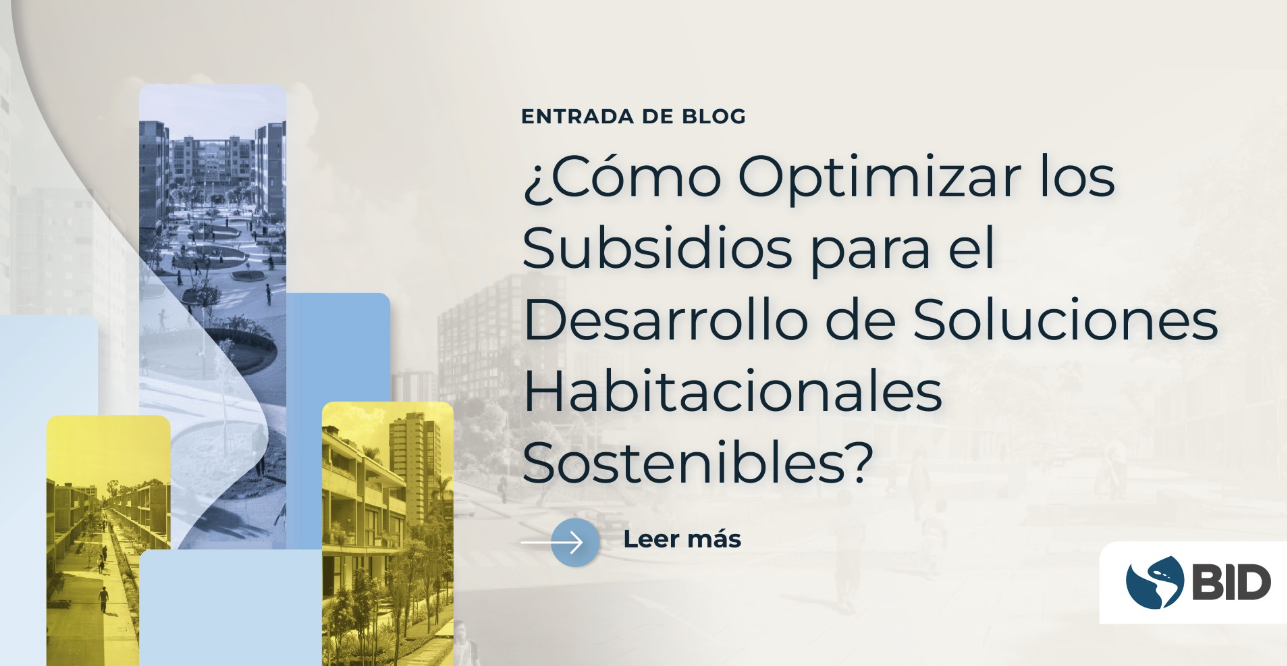Este artículo está también disponible en / This post is also available in: Spanish
Housing subsidies are financial aids provided by governments or private institutions to make housing more accessible to low-income individuals and families. These subsidies can include housing vouchers, direct rental subsidies, mortgage interest tax deductions, and funds for the development of affordable housing, thereby reducing costs and facilitating access to a decent home.
What Does Subsidy Optimization Entail?
The optimization of housing subsidies aims to maximize access to quality housing and promote inclusive and sustainable urban growth. This is achieved by designing efficient and equitable programs tailored to local needs, allowing for a fair allocation of resources and fostering public-private collaboration to create synergies among key actors in the construction of sustainable housing solutions.
Webinar Overview
In the Housing and Urban Development Division, we organized a webinar on June 5, 2024, focusing on the optimization of housing subsidies. During this event, we discussed key strategies to enhance the effectiveness and efficiency of subsidy programs. Continue reading to learn about the main ideas and recommendations highlighted in this event.
Key Messages
Optimizing housing subsidies requires a comprehensive approach that combines robust data, intersectoral collaboration, and active community participation. According to the webinar discussions, the following elements are essential for the optimization of housing subsidies:
- Establishing an Appropriate Political Environment and Proper Segmentation of Underserved Groups:
- A favorable political environment and the proper segmentation of underserved groups are fundamental. It is crucial to adjust subsidies to allow the incorporation of capital market funds and develop flexible policies that adapt to local needs, considering different types of housing.
- Utilizing Robust Data and Promoting Continuous Evaluation:
- Subsidy programs must be based on robust data to ensure that resources reach those who need them most. Developing monitoring and evaluation mechanisms is essential to adjust programs based on the results obtained, ensuring their long-term effectiveness.
- Promoting Public-Private Collaboration:
- Collaboration between the public and private sectors is vital for the successful implementation of subsidy programs. This collaboration should include the participation of financial institutions, real estate developers, and civil society organizations.
- Implementing a Framework of Transparency and Adaptability for Score-Based Subsidy Models:
- Effective implementation of score-based models requires a solid database and active community participation. This ensures transparency, efficiency, and equity while allowing flexibility and adaptability to changes in the socioeconomic conditions of beneficiaries. Essential criteria to consider include income, payment capacity, current living conditions, and environmental sustainability, among others.
- Strengthening Local Governments and Promoting Community Participation:
- Effective implementation of subsidies for sustainable housing solutions requires strengthening local governments. Municipalities play a central role in planning and executing sustainable housing strategies, working closely with the community and other key actors. Involving the community in the design and monitoring of programs not only improves transparency but also ensures an effective response to the real needs of the people.
- Designing Clear Guidelines and Optimizing Land Use:
- Establishing clear guidelines is essential for sustainable and inclusive implementation of urban development projects derived from the subsidy strategy. Optimizing land use and leveraging the value increase associated with improved connectivity can contribute to the sustainability and financial autonomy of the housing system.
Conclusion
Optimizing housing subsidies requires a favorable political environment, robust data, and public-private collaboration. Community participation is key to designing and monitoring these programs, ensuring they respond to real needs. Strengthening local governments and establishing clear guidelines ensures that projects are sustainable and inclusive. Additionally, optimizing land use and promoting green housing and sustainable urban regeneration are essential for the effective and equitable implementation of subsidies.
We invite you to watch the webinar recording to learn about the housing subsidies implemented in Mexico and Chile. Delving into progressive rate credit schemes and social collection policies, as well as affordable rental schemes for low-income families.

